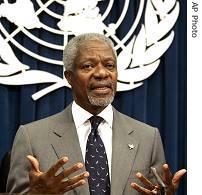2006年VOA标准英语-Many Give Annan High Marks as UN Chief, Despite(在线收听)
By Peter Heinlein
United Nations
13 December 2006
Kofi Annan is completing 10 years as U.N. secretary-general to applause and ovations from his legions of fans. In a series of scripted events, he is reliving the glory days of his first term, when he enjoyed "rock star" status and was awarded the Nobel Peace Prize. Correspondent Peter Heinlein, who covers the U.N. for VOA, filed this portrait of Mr. Annan the career U.N. officer who rose through the ranks to become the world body's first black African leader.
 |
| Kofi Annan (file photo) |
The secretary-general denied any wrongdoing, but the verdict of the Volcker Commission, which he appointed to investigate the oil-for-food operation, laid some of the blame at his feet.
Scholars and diplomats describe Mr. Annan's record as a mix of grand accomplishment and painful disappointments. He succeeded in raising the profile of the world body. But he was always haunted by his earlier failure, as U.N. peacekeeping chief, to prevent the genocide in Rwanda. More recently, Sudan's leaders flatly rejected his effort to persuade them to allow U.N. peacekeepers into Darfur to stop the carnage there.
Moreover, some of the reforms he promoted, such as creating a new Human Rights Council, in the end proved to be no improvement over the failed body it replaced.
In a recent informal chat with representatives of women's groups, he lamented the slow progress in preventing wars and alleviating human suffering.
"There [have] been more wars on my watch than in any other decade. Not that I had anything to do with the wars. From Kosovo to Afghanistan to Iraq, Darfur, Lebanon, Democratic Republic of Congo and some minor ones. But we've also ended some wars, from Sierra Leone to Liberia, Burundi, Angola, East Timor, and we can say there is some progress because today, objectively, there are fewer civil wars and fewer wars today than a decade ago. And yet the world seems really, really messy," he said.
Veteran U.N. watchers say despite his failures and his flaws, Mr. Annan made some valuable contributions. Professor Edward Luck of Columbia University says Mr. Annan succeeded in raising the world body's international profile.
"I think he'll be remembered as a visionary leader, one who had a lot of big ideas and a lot of bold initiatives. Certainly someone who would be the closest to being a household name for a secretary-general since Dag Hammarskjold. On the other hand, like Hammarskjold, he actually had a rather uneven and at times rather rough tenure," he said.
Susan Myers, executive director of the New York office of the United Nations Foundation, calls Mr. Annan a "pioneer" in promoting new ideas, and in transforming the secretary-general's job from an administrator to that of the world's diplomat-in-chief.
"Kofi Annan has been the uberstatesman [great statesman] and diplomat. I think that the prestige he lends to issues, even when people disagreed with him, he's handled them with the highest degree of diplomacy, and a certain sense of grace and humility that people really respect," she said.
Columbia's Edward Luck, however, argues that while Mr. Annan's reputation remains strong, the standing of the world body has suffered.
"One of the things I think is quite striking is that while his personal popularity, despite oil-for-food, remains quite high, in many ways as a global diplomatic rock star, on the other hand, the reputation of the organization has not kept up, and in some ways seems to have faded a bit, and that seems to be partly because of this gap between words and deeds and big ideas and the ability to fulfill them," he said.
So at the age of 67, Mr. Annan walks away from the U.N., with a Nobel Peace Prize tucked under his arm, handing the reins of the organization to a South Korean diplomat five years his junior. But he has hinted strongly that he will not leave the world stage completely. After a long vacation, he is said to be planning a return to public life, possibly as the head of a charitable organization.